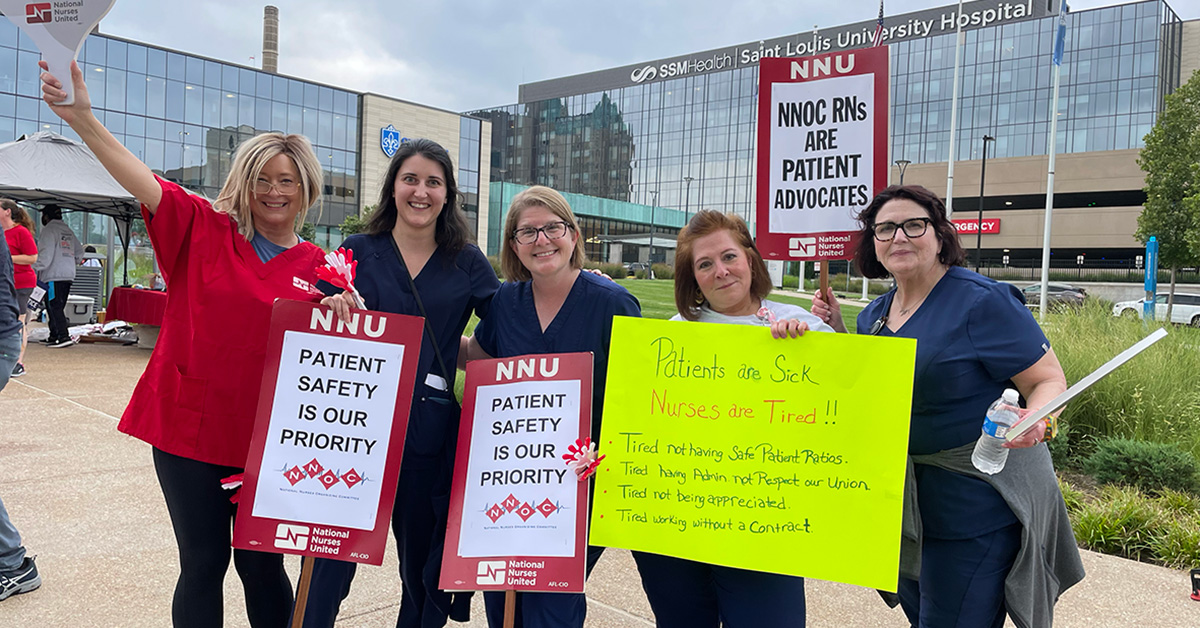Press Release
Saint Louis University Hospital nurses overwhelmingly vote to authorize strike

SLUH nurses voted to authorize a strike due to chronic short staffing, patient and staff safety, and management’s failure to recruit and retain experienced RNs
Registered nurses at SSM Health Saint Louis University Hospital (SLUH) in St. Louis, Mo., voted yesterday 94 percent in favor of authorizing their nurse bargaining team to call a strike if the issues RNs have been raising in ongoing contract negotiations remain unresolved, announced National Nurses Organizing Committee/National Nurses United (NNOC/NNU).
SLUH nurses have been in negotiations with the hospital since May 2023 to address chronic short-staffing of nurses and ancillary staff, high staff turnover, and management’s failure to recruit and retain experienced nurses. The vacancy rate for RN positions at SLUH has been higher than 30 percent since the spring of 2022. Short staffing jeopardizes patient and staff safety and also results in increased workplace violence. The RNs held an informational picket about their deep concerns on July 19.
If the RN bargaining team does call a strike, the nurses will give at least 10 days of advance notice to the hospital to allow for alternative plans to be made for patient care.
SLUH nurses say they have been sounding the alarm about the staffing crisis and the impact on patient care for nearly two years, but management has ignored their suggestions about improving retention or working conditions. Since 2020, SLUH has hired more than 1,600 nurses, but the majority of those nurses have left.
“We serve some of the most vulnerable and underserved patients in the St. Louis area,” said Earline Shepard, RN in the cardiac catheterization lab at SLUH. “Our patients deserve quality care from well-staffed units. SLUH nurses on the front lines are willing to put everything on the line for our patients and our profession. It is deeply disturbing that management has been unwilling to adopt staffing standards that have been proven to save lives. That’s why we have voted to authorize a strike.”
“SLUH is an educational facility, yet it has quickly become a training ground for new graduates who aren’t getting the training and support they need and deserve,” said Sarah DeWilde, RN in the medical-surgical unit at SLUH. “When I was a new graduate, I received invaluable mentorship, and I make it a point to provide it to new hires. It’s a shame when new graduates leave for better opportunities after several months of investment and training at SLUH. When that happens, patients are deprived of their skill and knowledge.”
“We have proposed numerous protections and practices that would prevent acts of workplace violence that are endangering patients and staff, but at the bargaining table, SLUH seems uninterested in making our workplaces safer,” said Jessica Tulk, RN in the emergency room at SLUH. “Short staffing is directly correlated with workplace violence. Patients and their loved ones can become understandably frustrated and confused when there are delays in care due to a lack of staff, and unfortunately, this can escalate into acts of violence. If we have the appropriate number of staff who have the proper training, we can prevent tense situations from escalating into acts of violence.
According to the National Council of State Boards of Nursing, there are 117,831 nurses in Missouri with active licenses as of Aug. 29, 2023, but according to the most recent data from the U.S. Bureau of Labor Statistics, only 78,900 are working as nurses. There is no nursing “shortage” in Missouri. Nationwide, there are more than a million registered nurses with active licenses who are choosing not to work at the bedside because of the hospital industry’s unsafe working conditions. More data and information debunking the nurse “shortage” myth can be found here.
National Nurses Organizing Committee has represented the nurses at St. Louis University Hospital since 2012.
National Nurses Organizing Committee is an affiliate of National Nurses United, the largest and fastest-growing union and professional association of registered nurses in the United States with nearly 225,000 members nationwide. NNU affiliates include California Nurses Association, DC Nurses Association, Michigan Nurses Association, Minnesota Nurses Association, National Nurses Organizing Committee, and New York State Nurses Association.